|
|
 |
| My Favourite Planet > Blogs > Cheshire Cat Blog > 2011 |
 |
 |
back |
The Cheshire Cat Blog
 |
 |
1 April 2011 |
 |
| |
 |
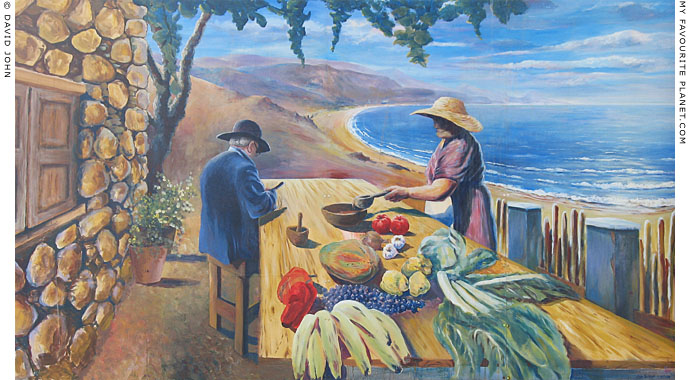
Painting of the idyllic life on La Isla Afortunada |
| |
The Fortunate Isle
The mysterious case of the invisible island |
| |
When The Cheshire Cat received an unexpected e-mail in Spanish, announcing that a statue
of him was about to be unveiled, he was delighted, baffled and bemused. Who was the
mysterious Mayor of Afortunada? And where on Earth was this place Afortunada anyway?
With the help of an academic author in Madrid, a Swedish geologist and a 15 year-old
computer wiz, we discover an unknown island far out in the middle of the Atlantic Ocean.
The mystery is unravelled in the following exchange of e-mails between The Cat
and Dr. Antonia Martinez of the University of Madrid. |
|
| |
 |
| |



the_cat |
|
From: The Cheshire Cat @ My Favourite Planet
To: Dr. Antonia Martinez, University of Madrid, Spain
Dear Toni,
thanks for sending me the copy of your latest book. As you may remember, my Spanish is not too hot, so I will have to wait for the English edition to be published before I can read it. It looks very impressive though, wonderful photos and illustrations (as one would expect), and it even smells right! "I love the smell of printing ink in the morning..." As usual, the photo on the back cover doesn't do you justice.
I have just received a strange e-mail from somebody signing himself the "Alcalde", which I guess is the Mayor, of somewhere called Afortunada. Since the mail address ends in .es, I assume that Afortunada is somewhere in Spain, but so far I haven't been able to find out where this place is. Presumably it is a tiny village someplace.
Could you please tell me what this "Alcalde" wants? (Copy of the e-mail attached.) I am sure that you're very busy right now (as always). Of course, I could show the mail to Miguel at the local Spanish restaurant, but I suspect this may be something important. After all, it's not every day that we receive mail from a mayor. Hopefully, it is not just another boring spam.
Thanks in advance, The Cat
Attachment: copy of e-mail
|
|
 |
 |
| |



toni_m |
|
From: Dr. Antonia Martinez, Universidad Complutense de Madrid, España
To: The Cheshire Cat @ My Favourite Planet

¡Hola Gato!

You are right: I am MUY MUY busy at the moment. Apart from publicizing the new book (interviews, signings, the usual circus), the terrible exam season is almost here again, and some of my students are driving me crazy by driving themselves crazy.

I have read the mail you forwarded, which is written in a very charming, old-fashioned Spanish. It says that the Mayor's children and other pupils of the local high school are great fans of the The Cheshire Cat Blog. They have been using the materials on the website for their school English and geography projects. The communidad is so pleased with the kids' enthusiasm that they would like to make a statue of "El Gato de Cheshire" in the new public park they are building in Afortunada.

So, Congratulations! Not only have you many fans in Spain, but they even want to immortalize you.

The place Afortunada itself, I have never heard of. This is a big surprise for me as I thought I knew my own country very well. It looks like I also have still much to learn.

I am mildly intrigued. I will make further enquiries as soon as I have time.

¡Hasta luego! Toni
|
|
 |
 |
| |



the_cat |
|
From: The Cheshire Cat @ My Favourite Planet
To: Dr. Antonia Martinez, University of Madrid, Spain

Hi Toni,

the stress of exam time I definitely do not envy you; the publicity surrounding your new book, well perhaps, a teensy bit ...

News of an unknown fan group of teenagers somewhere in Spain is indeed intriguing. And the idea that the locals want to erect a statue to "El Gato de Cheshire" doubly so. To say the least.

This is not exactly the "target group profile" we have been aiming at, but everybody here is very excited, though somewhat bemused about this development.

So, now it’s even more frustrating that I can find absolutely no information about a place called Afortunada, even on the internet. Maybe there is info on some Spanish website, but with my poor knowledge of Spanish I simply cannot get any further with my searches.

I look forward to any news, or even clues, that you may be able to come up with. As ever, we appreciate your cooperation.

Cheers, The Cat
|
|
 |
 |
| |



toni_m |
|
From: Dr. Antonia Martinez, Universidad Complutense de Madrid, España
To: The Cheshire Cat @ My Favourite Planet

Hey Fat Cat!

Sorry it has taken so long to write to you. Finally I have a little time, and I have some good news!

On Tuesday Jacinto had his birthday (he sends his regards and asks, when are you coming back to Madrid?). We had a great party, mostly family, close friends and university colleagues. Anyway, there was this Swedish geologist there, Olaf Petersen, a colleague of Jacinto's cousin Maria. (I think they are more than just colleagues, but that, muy Senor Gato mio, is quite another historieta.)

A group of us were standing around talking shop, and I asked if anybody had heard of this place Afortunada. None of the Spanish friends had ever heard of it. Alicia thought that it was maybe one of these places built just for tourists and German people who buy retirement homes on the Costas. Then Olaf suddenly said, "Afortunada? I’ve been there."

Well, you could have heard a cocktail stick drop. For a start, none of us even knew this quiet, shy guy could even speak Spanish, and we had all been doing polite small-talk with him in English the whole evening. And he had been politely replying in English. But he speaks Spanish very well! With a Viking accent, naturally, and he uses some strange dialect words and phrases he has learnt on his travels. It turns out he is a visiting professor at Universidad Politécnica de Madrid (the Technical University).

Anyway, he says this Afortunada is an island in the middle of the Atlantic, way off the West African coast. Some years ago, during his post-graduate studies, Olaf worked on a geological survey of the island, and even wrote a few papers on the place. The team's findings were not of earth-shattering importance, and since there is no oil or valuable minerals – not even guano - around the island, their work has largely been ignored by the world.

I wanted to be sure we were talking about the same Afortunada, so I told him about the e-mail from the Mayor. And... he and the very same Mayor were great friends, and had spent many long nights singing, dancing, eating and drinking together with the locals and the geological team when he was on Afortunada. (This explained his use of dialect, which is strangely old-fashioned like that used in the Mayor's e-mail.) Back then, the Mayor was just a young teacher. Now he is not only the mayor but also the headmaster of the island's small high school. What do you think of that?

We all immediately rushed into Jacinto's study (still the usual chaotic mess, as always), dug out his laptop from under all the papers, books and chocolate wrappers (he’s given up smoking again), and Olaf showed us the website the Afortunada school kids had made themselves. And there were lots of photos and text from "the Cheshire Cat Blog" that they had translated into Spanish, along with the kids' own comments and essays.

It looks like they were especially excited about the photos of the snow and snowmen. They hardly ever see snow on the island - and certainly never enough to make a snowball never mind a snowman. Around Christmas time, if there is even a tiny bit of snow on the island's only high mountain (an extinct volcano), everybody rushes there to look at it in wonder. So, along with the photos, there are drawings and paintings the kids have made themselves of how they imagine their island would look covered in snow. Big snow castles, and of course plenty of snow dinosaurs.

I didn't make a note of the web address (too many mojitos), but apparently, later in the evening, I agreed to go with Olaf and Maria to her home village outside Madrid for the weekend. I don't remember this plan, but Maria just phoned to remind me - she knows me too well. So I will ask Olaf more about his island. Now I'm beginning to get really hooked on finding out about this place.

Will send you more news next week. Until then ... Toni
|
|
 |
 |
| |



the_cat |
|
From: The Cheshire Cat @ My Favourite Planet
To: Dr. Antonia Martinez, University of Madrid, Spain

Hi Toni,

Who are you calling fat? Flaming cheek!

What a stroke of luck, meeting a real live Viking who is a drinking buddy of our elusive Alcalde of Afortunada. Now that's what I call serendipity, or something.

I knew you would come up with the goods. We wait with bated breath for your return to Madrid.

Enjoy your weekend in the country, The Cat
|
|
 |
 |
| |



toni_m |
|
From: Dr. Antonia Martinez, Universidad Complutense de Madrid, España
To: The Cheshire Cat @ My Favourite Planet

Buenos dias, o purring one,

What a weekend! I think I have been living in the city too long. A few days in the country were really a treat. It made me think it is time for me to take a short break from work and city life...

But it was not so tranquilo as you may be thinking. They had a big fiesta in the village, and the whole place was full of life and noise. We were dancing and laughing all the time.

In between all this, Olaf found the time to tell me more about this mysterious island. I will summarize what he told me and then try to do some more detailed research later in the week.

Afortunada is the largest of a group of nine islands in the Atlantic, 200 km off the West African coast. The other islands are tiny, uninhabited outcrops of the same mass of land which was pushed violently up from the ocean floor by volcanic activity between 16 and 14 million years ago, during the Miocene period.

Geology is not my thing, and I don't know the difference between Miocene and Plasticine, but Olaf has promised to send me copies of his papers. They should make riveting reading. Not. They were written in the 1980s, before we all got computers and internet, and have not yet been digitalized. He actually wrote them all by hand, as he didn't even own a typewriter, and had to pay someone to type them for him. Imagine that! I will try to have them scanned and sent to you.

So basically, the place is just one big volcano, the main island's highest mountain, 2540 metres high, was still active until the late 17th century. Today the summit is called La Luna, but in historical times it was known by several names, all meaning Moon, in different languages. The name was originally given to it by the Huenches, the island's aboriginals, for whom the mountain was the sacred home of their moon goddess. The Huenches are thought to be related to the Berbers of North Africa, and settled on the island from around 1,000 BC.

Beyond the tiny archipelago the sea is very deep. Afortunada generally has a warm-to-hot, dry climate, but sudden storms over the Atlantic bring plenty of rain, so that there are a number of small rivers and three large lakes, all of which were also considered holy by the Huenches.

Being a volcanic island, the soil is very rich and suitable for growing many types of plants and crops. However, the topography is very rugged, making farming in many parts of the island challenging. Since the time of Afortunada's creation, many plant types, insects, birds and small animals somehow found their way to the tiny archipelago and have developed quite separately from their counterparts on the mainland. Some species are unique to the islands.

At first I was astonished when Olaf told me that there have been no serious studies of the flora and fauna. But after he described the island's position and a little about the history I was less surprised.

There is no record of Afortunada's existence before the end of 16th century, despite the lust of several European nations, including Spain, Portugal and England to claim new territories in and across the Atlantic by force from the time of Henry the Navigator. Because of prevailing winds and currents and the island's isolated geographical position, it seems that nobody expected to find this crumb of land here, and as it was not on any existing sea route, it had the unusual luck of not being "discovered".

According to Olaf, the first settlers from Europe were actually Andalusian refugees from the Spanish Reconquista and Inquisition at the end of the 15th century. Since most of them were Moors, Arabs and Jews, strictly speaking it wasn't a settlement of "Europeans". Perhaps an academic nicety, but the identity and mix of these settlers made a huge difference to the consequent story of the island when compared with the history of places colonized by the European powers of the time.

Somehow the islanders remained independent and isolated for centuries, which is why there seems to be so little known about them. They have unanimously vetoed tourist development several times, despite lucrative offers and even threats from officials of successive Spanish governments and big tour companies.

The story of their accidental arrival on Afortunada reads like a plot from a Shakespeare play. Or at least it will as soon as I have written out the notes I am taking from my conversations with Olaf. As I write, I realize that I still have many more questions for him. I have just arranged to cook dinner for him and Maria on Friday evening.

Olaf is quite enthusiastic about sharing his knowledge about the island, and is amazed that anybody should take such an interest in the place. I don't think Maria is too happy about it all though. Boredom? Jealousy?

Meanwhile I have written to friends and colleagues all over the place, from Lisbon to Malaga, to ask them if they can find any information about this group of refugees from Andalusia.

If you like, I could write a reply for you to the Mayor of Afortunada.

I had better get back to my work. So, that’s it for now, Toni
|
|
 |
 |
| |



the_cat |
|
From: The Cheshire Cat @ My Favourite Planet
To: Dr. Antonia Martinez, University of Madrid, Spain

Hi Toni,

I’m impressed. Little did I think when I forwarded you the Mayor's e-mail that it would lead to the uncovering of such a history mystery. But I should have known that once you get the bit between your teeth, there’s no stopping you. Not that I would compare thee to a horse, or anything.

Yes, yes! Please write to the Mayor for me. Tell him that "El Gato de Cheshire" feels flattered and extremely honoured at the prospect of having a statue dedicated to his humble feline self standing in Afortunada’s new park, etc. Also, that we have magnanimously decided not to sue him for the use of our photos and texts on the school website for breach of copyright. (No, not really, don’t tell him that. That’s only a joke.) Tell him if there is anything we can do to help the children with their school projects, not to hesitate to ask. We will be delighted to assist. Etc., etc.

You know the kind of thing, and you are much better at it than me, especially in Spanish ;-)

If you are happy about taking on the burden of responsibility, please feel free to represent My Favourite Planet in this matter. We give you carte blanche, but can unfortunately offer you little else, other than our undying gratitude and admiration.

Yours grovelingly, The Cat
|
|
 |
 |
| |



toni_m |
|
From: Dr. Antonia Martinez, Universidad Complutense de Madrid, España
To: The Cheshire Cat @ My Favourite Planet

Dear Cat,

You are soooooo generous. I don’t think.

I wrote to the Mayor with honeyed words, and Olaf also wrote to him to renew their acquaintance and introduce me to him.

I received a reply from him a few hours later. Or, to be exact, I received a reply from his daughter, aged 15. He “humbly apologizes” for the fact that he has absolutely no idea about computers, internet and such things, and was dictating his reply to his “little Miranda” who is the computer genius of the family.

I am forwarding you his/her mail, even though you are too lazy to learn enough Spanish to understand it. I have to admit some of his ancient Spanish makes difficult reading, even for me.

On behalf of the people of Afortunada, he thanks you for your gracious reply and is happy that you are happy about the sculpture project. He will send the artist’s sketches of the intended sculpture, a photo of the maquette and further information as soon as Miranda has scanned them all in on the school computer.

The sculpture, he says, is one of a group made by several local artists, which will all be installed in the new park. The subjects, including one representing the first settlers’ meeting with the aborigines, were chosen by popular votes by islanders of all ages. This, I guess, is how your teeny fans got to choose you as a subject. All the sculptures are nearly finished and there will be an official unveiling on the 14th of next month. “You and your family and learned physician are warmly invited to attend as guests of our beautiful island.” he seems to think I am your personal MD. And as for your family, you had better acquire one quick, amigo.

Finally, he adds that he is certain that the children have many questions and ideas they would like to send you. He will tell them to send these collectively, and not to bother you too much. You are to inform him if they steal too much of your precious time, esteemed signor.

Should I tell him you will be accepting his invitation? You could stop off in Madrid on your way. Jacinto would be happy to see you again. Me too, I guess ;-) - to you too. You could meet Olaf, Maria and the gang.

Let me know if you can make it and I will organize the travel arrangements from here to Afortunada for you.

Olaf told me that the only way to get to Afortunada is by the weekly post ship which delivers mail, goods and the occasional passengers to and from the island. The journey takes 24 hours!

They have an airstrip for emergency flights at which small private charter planes can land, but that would be far too expensive. They have been meaning to build an airport for decades, but nobody there is too enthusiastic about it. They don’t trust the airlines and fear they would start dumping thousands of tourists on them. Such is the islanders' sense of duty and hospitality, they are afraid they would feel obliged to provide accommodation for them, which would spiral into an inevitable and unstoppable escalation of tourism. Also there’s the question of where to build an airport on such a small, rugged island. Nobody seems willing to sacrifice precious land for such an abomination.

The more I learn about these whacky Afortunadans (or whatever they call themselves), the more I like and admire them.

There is not much time before the 14th, so hurry up deciding, Gato. Toni
|
|
 |
 |
| |



toni_m |
|
From: Dr. Antonia Martinez, Universidad Complutense de Madrid, España
To: The Cheshire Cat @ My Favourite Planet

Hello, me again,

I almost forgot something. Well, I did actually forget, but now I remembered again.

Olaf gave me some of the photos he took from his time in Afortunada. He showed me some of his many albums, mostly with pictures of his previous girlfriends in various exotic places. Like I said, he’s such a shy guy. It really is the quiet ones you have to watch out for.

Maria told me she’s going to burn those albums one day. Then sparks will fly!

Olaf says he isn’t a very good photographer, but he has three (why three?) expensive-looking cameras with more buttons and dials than a space shuttle, and they do everything except make churros.

Anyway, they were all taken on film (what’s that, grandma?), so he has scanned them for you, and says you can use them for your blog if you want. He also wrote some captions for them, but they're not very detailed.

Enjoy, Toni
Attachments: Olaf’s snapshots of Afortunada + captions as text file
|
|
| |
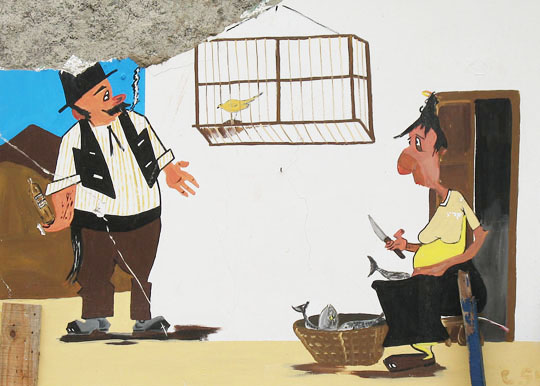
Quite another view of family life on Afortunada and the influences
of modern "civilization" from outside the island. From an old mural
in a tavern, damaged by an earthquake. |
| |
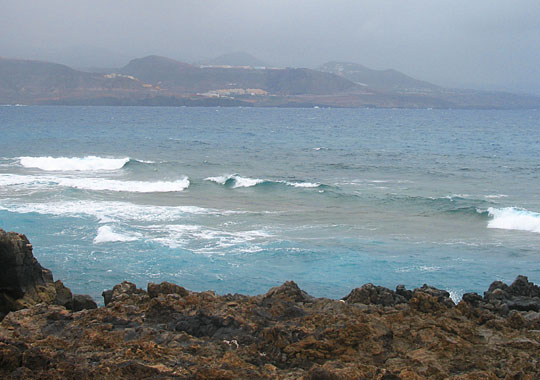
View of Isla Afortunada's main town from one of the nearby uninhabited islets. |
| |
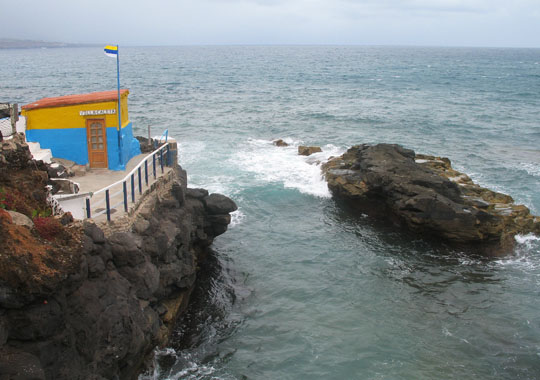
Coast guard's hut on the rugged north coast. |
| |
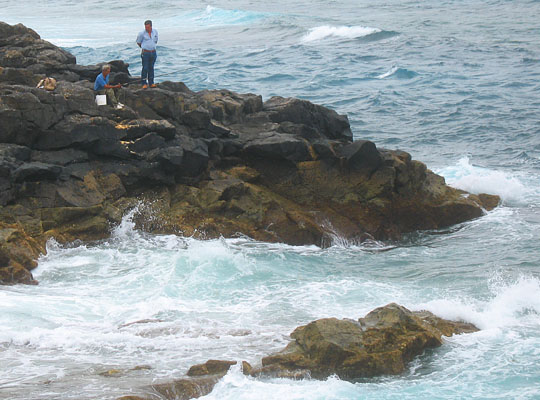
Afortunadans fishing on the rocky shore. |
| |
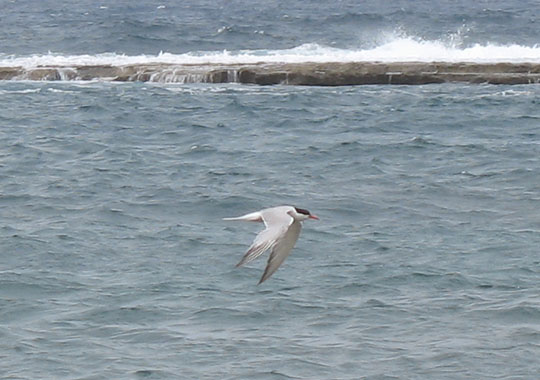
Sea swallow on the north coast. |
| |
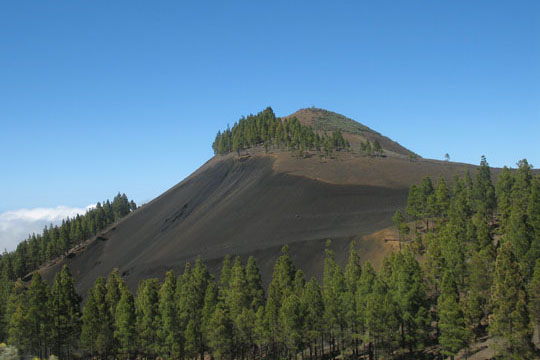
The peak of La Luna, the highest point on Isla Afortunada.
The left slope is the top of a chaldera (volcanic crater). |
| |
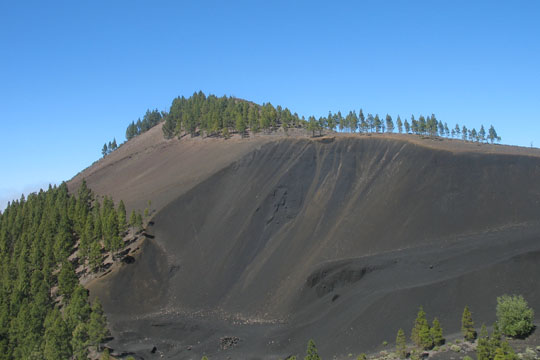
La Luna's peak from a different angle.
Note the coarse, rich volcanic soil typical of the island. |
| |
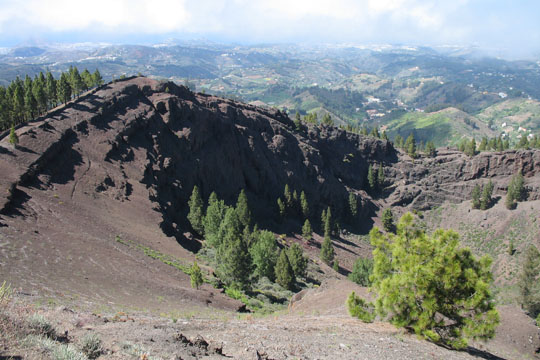
The lip of the opposite (western) edge of the chaldera or volcanic crater.
To the north, the rugged landscape and a cloud-covered sky.
The island has several micro-climates, so that it can be cold and rainy in
the north, hot and sunny in the centre and cloudless and windy in the south. |
| |
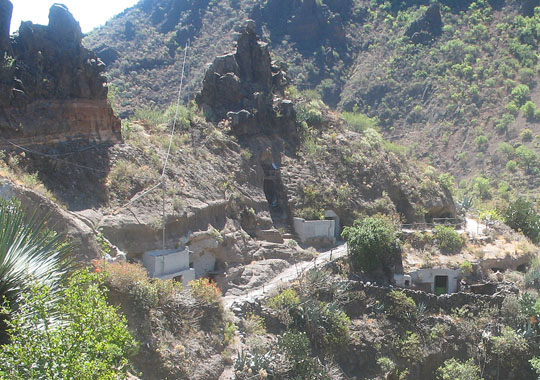
Buildings of a mountain farm. |
| |
Sculpture of one of Afortunada's aborigine Huenches with screaming child,
at one of the island's oldest human settlements near the island's east coast.
The large red rock (top left) is the entrance to a cave dwelling. |
| |
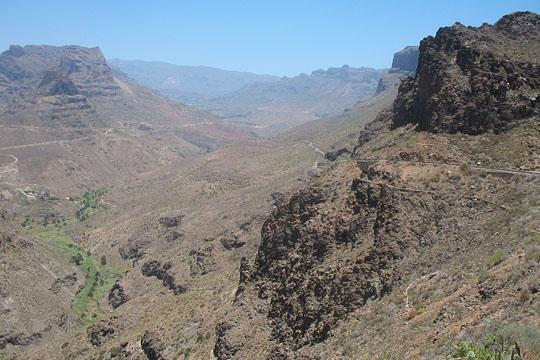
River valley in central Afortunada. The area
around the stream is rich in natural vegetation. |
| |
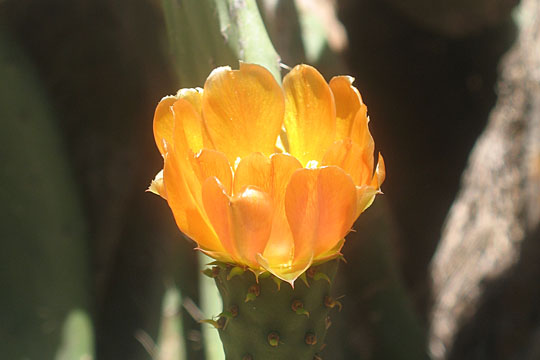
Mountain cactus flower. |
| |
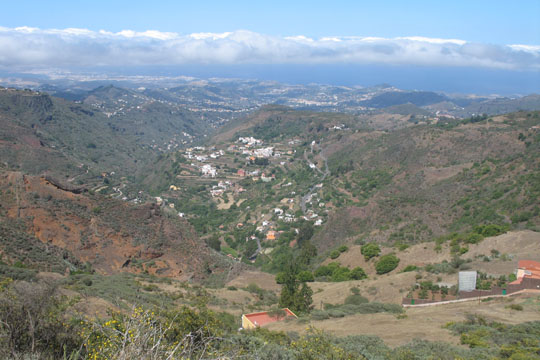
Mountain village in the north of the island. |
| |
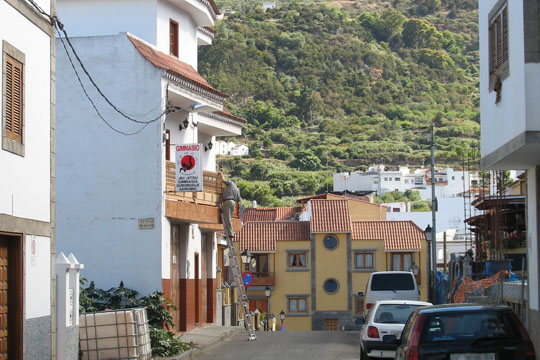
Street in the mountain village. |
| |
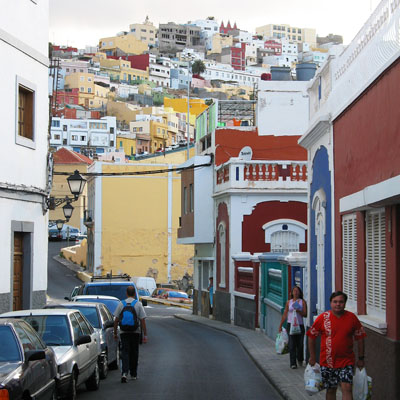
Rush hour in the main town of Afortunada. |
| |
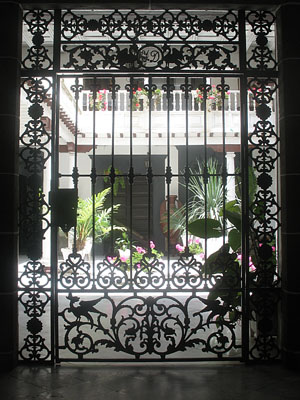
Courtyard of the town hall, in the main town of Afortunada. |
| |
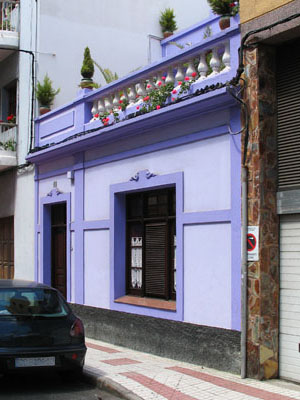
Colourful old house in the main town of Afortunada. |
| |
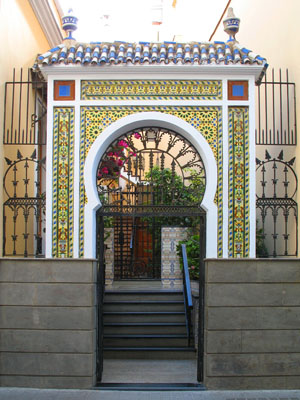
Moorish-style gateway in the main town of Afortunada. |
| |
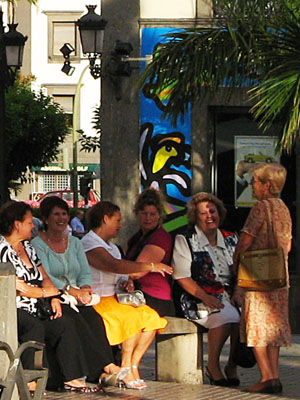
An early evening meeting of Afortunadan women. |
| |
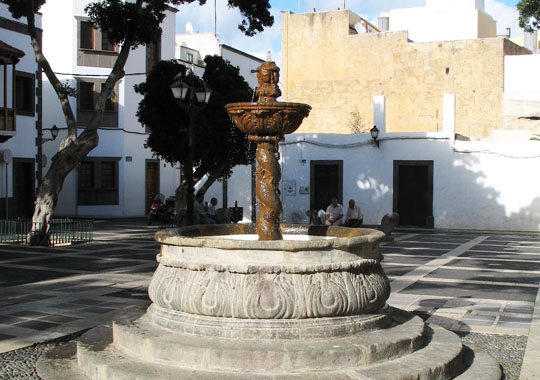
Fountain on a small plaza the main town of Afortunada. |
| |
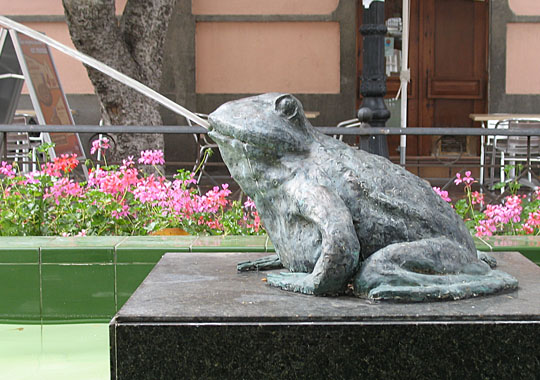
Frog fountain on Afortunada's Plaza Mayor. |
| |
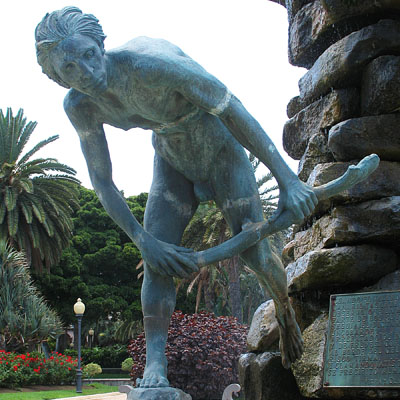
Sculpture of one of Afortunada's aborigine Huenches
at a memorial to the island's history. |
| |
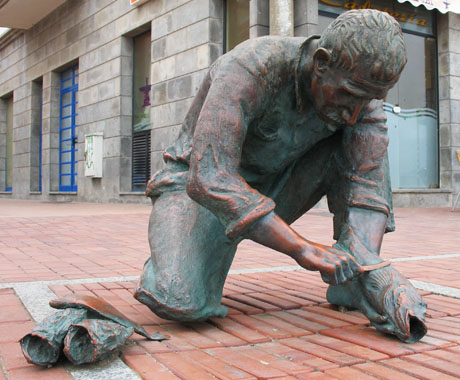
Statue of a local fisherman cleaning his catch. |
| |
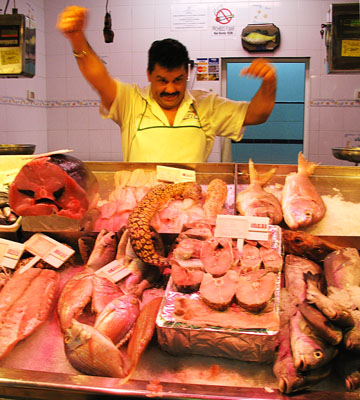
Fishmonger at Mercado del Puerto,
the indoor market at Afortunada's main harbour. |
| |
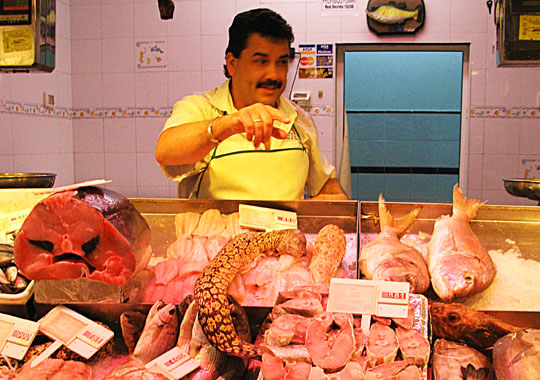
The fishmonger enumerates his wares. |
| |
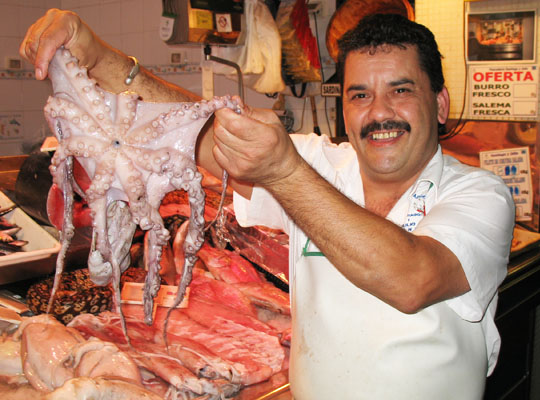
Fishmonger with octopus. |
| |
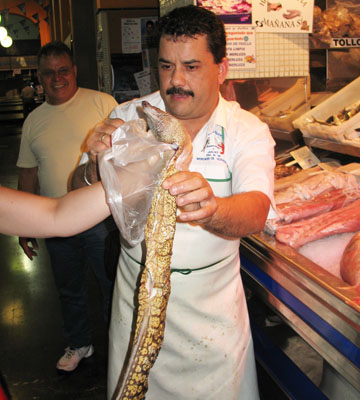
Fishmonger with eel. |
| |
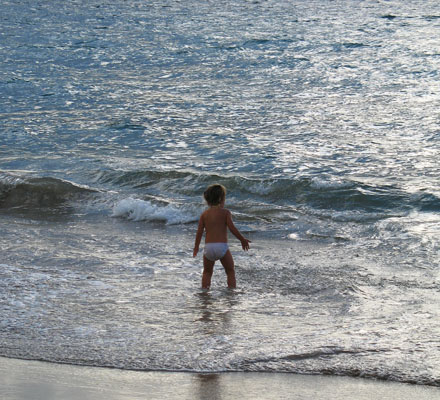
At the edge of the endless sea. |
| |
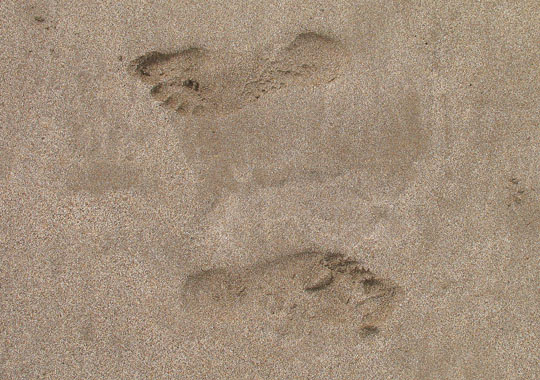
She went thataway ... Or was it thataway? |
 |
 |
| |



the_cat |
|
From: The Cheshire Cat @ My Favourite Planet
To: Dr. Antonia Martinez, University of Madrid, Spain

Good morning Toni,

Oh b****r! I have already planned and booked a long trip through the Caucasus with a complicated itinerary, guides, transport, visas, etc., starting at the end of this month. There is no way I can get out of it now. I have thought it over, but there’s really no way. What a shame!

Could you please thank the Mayor for his kind invitation, and tell him that I am desolated not to be able to attend, but that I would be honoured to be permitted to visit his beautiful island in the Autumn.

Why don’t you go, as my representative and personal physician? You keep telling me that you need a break from the city, and the exams will be over by then. Maybe you can collect material for your next book. Call it “Afortunada, mon Amour”, or whatever that would be in Spanish. The story of the island sounds like it has the makings of an academic blockbuster. If you get some atmospheric snapshots, it could even make a handsome coffee-table edition. Only jesting, of course. Or am I?

Miaow, The Cat

P.S. Thank Olaf for the photos. I’ve already put a few of them online.
|
|
 |
 |
| |



toni_m |
|
From: Dr. Antonia Martinez, Universidad Complutense de Madrid, España
To: The Cheshire Cat @ My Favourite Planet

Dearest Pussy,

You know what? I think I WILL go to Afortunada for the statue unveiling. You’re right, it’s time for a change of scenery, and where could be better than a small unknown island in the middle of the Atlantic, uninfested by tourists – or tourist traps and trash. It is quite a charming prospect.

I haven’t mentioned a word to my publisher yet. Although you and everybody else think (perhaps with good reason) that I’m absolutely besotted with my work, I am not yet quite blinded by it. There are limits, you know, even for me. I sense that I would be abusing the hospitality of the islanders, who have obviously guarded their privacy and isolation for centuries, if I waltz over there, win their trust and grab the information and pictures needed to expose them in a book. While their unique geography, history, society and present status (more about all this soon, I promise) is fascinating, and I have been handed the opportunity to explore it on a plate (thanks to you, the Mayor, daughter Miranda and the ever so quiet Mr. Petersen), I doubt whether it would be fair to anybody to publish it all to the world.

What would be the point? It sounds as if the Afortunadans are already as proud of their island life as they can be. And to awaken the curiosity of the rest of the world would only lead to millions of people wanting to visit this modern Atlantis. The result could only be the advent of the dreaded tourism industry – the serpent in Paradise, with its apple of plastic trash. We have seen this happen in so any places: you only have to think of Mallorca. Or better still, let’s not think of Mallorca. It makes my Spanish blood boil!

So I shall have to sit opposite her at our next monthly lunch and bite my tongue. If I so much as mention Afortunada to her, she’ll start having multiple orgasms right there in the restaurant and make that scene from Harry met Sally seem like early Bergman. Then she will demand that I churn out a book on the island in time for the Christmas market. And if I don’t do it, she’ll get someone with even fewer scruples than me to do it. Talk about the burden of responsibility!

I spoke with my faculty seniors this morning about taking a break (without going into details), and they seem to think they can do without me for a few weeks. It made me feel a bit TOO dispensable, but what the hell.

So that’s it! I have written to the Mayor through Miranda, and I will be on the road to Afortunada at the beginning of next month, visiting a few friends and places along the way. It’s quite exciting.

Keep your whiskers clean, Toni
|
|
 |
 |
| |



the_cat |
|
From: The Cheshire Cat @ My Favourite Planet
To: Dr. Antonia Martinez, University of Madrid, Spain

Now I really do envy you. Since I last wrote I have seriously considered dropping everything and joining you “on the road to Afortunada” (“Just like Webster’s Dictionary, we’re Morocco bound…”).

But, o me misere, I just can’t swing it in time.

So, bon voyage, and… ahem, beuna Afortunada.

Mustache, The Cat
|
|
 |
 |
| |



toni_m |
|
From: Dr. Antonia Martinez, Universidad Complutense de Madrid, España
To: The Cheshire Cat @ My Favourite Planet

Very punny, Signor Gato.

Right now, I am trying to get all the things I need to get finished finished (if you understand what I mean), before I run away to the island. So many loose ends to tie, and lots of paperwork. I just finished marking exams, and am exhausted... Trying not to panic - too much. Why am I always like this just before I go on a journey?

I have had replies from some of the friends and colleagues I wrote to about Andalusians who fled Spain during the Reconquista, up to and after 1492 when the joint forces of Ferdinand of Aragon and Isabella of Castile conquered the last Moorish stronghold of Granada and most of the Muslims and Jews left for Morocco and other places. I could not provide them with many clues to go on, so it is not surprising that so far they haven’t been able to uncover very much in local records from the time of these chaotic upheavals specifically related to those who ended up in Afortunada. But I have received a few tiny gems of information which help putting the puzzle together, as you will soon see. I hope I have whetted your appetite a little.

When I return from the island I should have more clues: names of families, home towns, original addresses, their ships, etc.

Meanwhile, Olaf has given me a very interesting little book about Afortunada, which he dug out of one of the boxes in his basement. It was given to him by the Mayor during one of their drinking sessions. I hope the Alcalde doesn’t come to regret his inebriated act of generosity.

Apparently, in the early 1960s somebody on Afortunada thought it would be a great idea to write a book about the island and its geography and history. Perhaps they were talked into it by a printer’s salesman. You know the kind of thing I mean, primitive typesetting, horrible grey paper, blurry photos with over-saturated colours (now faded and yellowed with age), plenty of errors and typos (there’s even a 5 page errata slip) and a useless hand-drawn-map dotted with little symbols for which there is no legend or explanation. In short, the type of book which tourists buy but never get around to reading, which anyway is unreadable, and which, even if you could read it, would leave you with more questions than answers.

I think you have a whole shelf of such books in your office, yes? I Know I do. I keep looking at them and thinking, “Why did I buy all those useless books? The first should have taught me my lesson.” And then I think, “Why do I keep them? Why can’t I just throw them all away? Basta!” But we never can throw them away, can we?

So, this book was written and printed – 10,000 copies of it – before the Afortunadans suddenly came to their senses and decided not to publish it. Maybe it was the sight of the hideous object, who knows. So they put them all in a room, stacked in neat piles, and left them there. Good thing too.

Admittedly, I did glean a few bijou factettes which will help me finish off the historical summary I am preparing. I will send you a copy before I leave. Promise, promise, promise.

Now, if somebody could please tell me where I left my travel alarm clock. Probably still in my suitcase since my last journey - with a corroded battery.

Everything is OK. Really, Toni
|
|
 |
 |
| |



the_cat |
|
From: The Cheshire Cat @ My Favourite Planet
To: Dr. Antonia Martinez, University of Madrid, Spain

Same here. Plenty of last minute pre-flight manic panics. I have decided against lugging phrase books with me through the Caucasus. I would probably need about ten of them for all the language regions I will be travelling through. That’s what we’re paying guides and translators for. Real luxury.

And yes, I do also have a shelf groaning with awful tourist guide books and useless, undecipherable maps. They are bound to be worth a fortune someday. (Dream on, Cat.)

I just received the sketches and photo of the maquette for the sculpture by José Hernandez de Afortunada (it says here). It doesn’t look too bad, although he hasn’t quite caught my irresistible smile and the diamond-hard glint of the eyes. He makes me look too much like a common-or-garden moggy. But (sigh) who am I to complain at such a great honour, and what should I know about Art anyway? Just a hack, me.

| |


Something like this,
perhaps? |
I just thought of something: there’s no indication of the scale of Signor Hernandez’s masterpiece. I wonder if it will be as least as big as the lions on Westminster Bridge? Remember them? That freezing November evening when they seemed to suddenly appear out of the fog? Scary. Aye, them were the days, when lions were lions and drunken undergraduates were ... surprised they never passed their exams.

Looking forward to your history of Afortunada summary thingy. If you can’t manage it before you leave, don’t worry. You’ll probably have more time and leisure for such things once you get to the island. Lying on the beach with brash young men kicking sand in your laptop.

Get your skates on, or you’ll miss the boat, The Cat
|
|
 |
 |
| |



toni_m |
|
From: Dr. Antonia Martinez, Universidad Complutense de Madrid, España
To: The Cheshire Cat @ My Favourite Planet

Oh Cat of little faith (and even less brain),

You see! I already finished my “history of Afortunada summary thingy”, which you can see below in all its glory. I will rewrite it more thoroughly with names, dates and so on, as soon as I have pinned them down. At the moment it is still very NEMOW (Needs More Work).

Oh sorry, I didn’t think to ask the Mayor about how big the sculpture will be. As if size matters anyway, eh?

I will write again as soon as my feet touch the ground somewhere. I am not sure if Afortunada even has an internet café. When Olaf was last there such things had not been invented. And it looks like only school kids are capable of using the internet, and they use the school net. We shall see.

For now Adios, Toni

Attachments: Afortunada – a short historical sketch
|
|
|
 |
| |



toni_m |
|
From: Dr. Antonia Martinez, Universidad Complutense de Madrid, España
To: The Cheshire Cat @ My Favourite Planet

Afortunada – a short historical sketch

1

The first known visitors from Europe to the island of Afortunada actually arrived by accident. They were Andalusian refugees from the Spanish Reconquista and Inquisition at the end of the 15th century, when the Spanish kings were completing their conquest the Moorish lands on the Iberian Peninsula. Some people in Andalusia had seen the writing on the wall and decided to leave long before the fall of Granada in 1492. A group of families were able to buy three ships through secretive dealings with Portuguese merchants to make their escape from the terrible warfare. It was almost impossible to find good ships because so many other people also wanted to flee the Christians and their Inquisition. It was very much a sellers’ market. Therefore the ships they did manage to buy, at exorbitant prices, were old and not exactly in the best condition.

The group we are talking about was made up of not only Muslims and Jews but also Christians who had previously sought refuge in Andalusia because their beliefs or actions had displeased the powerful nobles and priests of Catholic Spain. Some of these refugees were even from noble families themselves. One, the doctor, author and sometime ship’s commander Sancho de Cortinas, is said to have been a cousin of Miguel de Cervantes, the author of Don Quixote, whose mother was Leonor de Cortinas. They all had in common a love of learning, science and the arts, and the families had thus formed bonds of close friendship over many generations, irrespective of faith. Among them were wealthy merchants and land-owning farmers, successful craftsmen as well as poorer artisans, artists and scholars. The rich paid the lion's share of the costs of their collective flight.

Because of the limited capacity of the ships and the urgency of their escape - which they had to undertake with great secrecy - each was able only to take a minimum of possessions. Mindful that they would have to set themselves up from scratch in a new, unknown land, most elected to take the tools of their trade, some livestock, seeds, a few valuable books and whatever materials and valuables they could manage to carry to the port without attracting too much attention to themselves.
2

Their eventual destination was uncertain. Naturally, they would first head for Morocco where the Muslims would be welcomed by relatives. Some of the Jews planned to continue on to Constantinople somehow, while the Christians had faint hopes that they may find a home in a Christian land as yet not scourged by the Inquisition.

One night, soon after their departure, their ships were blown off course by a huge storm. One of the three ships was wrecked on rocks on the coast of the uncharted island now known as Afortunada, and the other two were badly damaged by the tempest.

Miraculously, there was no loss of human life, though two goats and a cow perished, and the two surviving ships were able to save the passengers, crew and beasts of the wrecked vessel. They landed and set up camp at the nearest bay they found (later to become Afortunada's only town) and salvaged as much as they could from the wreck. Their initial plan was to repair the two remaining ships as quickly as possible and continue their journey, despite the fact that they had little idea where they had landed.

At first they assumed they were somewhere on the African mainland or a Spanish-occupied island. Either way, they feared an unfriendly reception from any inhabitants in the vicinity. The only evidence of human presence around the bay was a number of unfamiliar low structures made of stones piled up like pyramids. There was no way for them to tell who had built them or how long ago.

Following some discussion, they decided to send a small armed party, led by Sancho de Cortinas, to scout the area. Meanwhile the rest of the castaways built a makeshift stockade around their camp from timber salvaged from the wreck, rocks and other materials. Wisely they left untouched the strange pyramids, which they later discovered to be sacred structures of the island’s aborigines.

After three anxious days of waiting, they sighted the scouting party returning in the company of several half-naked, long-haired men and women with spears. These turned out to be the island’s aborigines, or Huenches, who had never before seen strangers on their island.

The story goes that when the scouts came around the sharp bend of a river valley and suddenly caught sight of the Huenches eating a meal on the bank outside their cave dwellings, each group were so surprised by the sight of the other that there was a long moment of astonished silence. Then the Huenche chief uttered a loud howling, which was actually a greeting but which put the fear of God into the scouting party. Fortunately, everybody kept their heads and what could have led to bloody catastrophe led to the beginning of friendship between the two very different peoples.

The chief insisted on entertaining the strangers as honoured guests. He treated them to a long party at which much of the strong local brew was drunk... It therefore took some time for the newcomers to explain that they had comrades waiting for them on the beach. The locals guided the scouts back to their landing place, and, with some trepidation on the side of the Andalusians, a long period of peaceful co-existence unknown anywhere else in the mid-Atlantic was established.
3

Eventually, the Andalusians stayed on and settled on the island. Sadly, they had unwittingly brought with them diseases to which the Huenches had no immunity, and very many of them died as a consequence. This almost led to hostilities, but the danger was avoided by the fact that the majority of the Huenches were more convinced by the good intentions of the strangers and the benefits of their arrival than the arguments of those few who believed that the intruders were devils intent on destroying them.

The Huenches, of which there were four clans on the island, had chosen to remain isolated from the rest of the world for centuries. Their ancient oral traditions told the myth of their escape from daemonic tyrants in an ancient, cursed land. Whatever the original reason for their voluntary isolation, they had maintained their largely peaceful stone-age lifestyle (they had neither metals nor the wheel) because of it. They built no ships or boats (although Olaf's team found ancient stone carvings of boats in a high cave) and preferred to do their fishing with spears and nets from the shores. They lived almost exclusively from fish, although they also ate wild fruits and a few engaged in rudimentary agriculture. Hunting and animal husbandry was totally unknown among them, and at first they were perplexed by the newcomers' horses, donkeys, cows, sheep, goats, chickens and ducks - and even cats.

All the groups learned to live with each other under the new circumstances, and most of the settlers decided to build a village on the beach where they had first landed. They lived from fishing, gathering wild fruits and from the milk, eggs and meat of their livestock. Over time some moved out into the surrounding countryside and set up small farms.
4

They named their new home Afortunada after the legendary Fortunate Isles or the Isles of the Blessed, known in Greek as μακάρων νῆσοι, the Makaron Islands, in Spanish as las Islas Afortunadas or las Islas de los Bienaventurados, mentioned by authors of antiquity such as Flavius Philostratus, Plutarch, Pliny the Elder and Ptolemy, and described as a blissful paradise with an ideal climate and abundant sources of food, in the Western Ocean, beyond the Pillars of Hercules (the Straits of Gibraltar), where mortals are received by the gods; "... where the air was never extreme, which for rain had a little silver dew, which of itself and without labour, bore all pleasant fruits to their happy dwellers..." (Plutarch, Life of Sertorius, Chapter VIII)

The more learned of the settlers, especially the Jews and Muslims, some of whom knew Latin and Greek or had read Arabic translations of Classical texts, explained to the others the myths of the Fortunate Isles and Atlantis. They decide to vote on a name, with an equal vote given to all over the age of five (this was the beginning of a democratic system used up to the present day). It seems that few cared for the name Makaron (it had quite different connotations in Spanish), and when they heard of the fate of Atlantis (it sunk) they unanimously rejected that too. But apart from a few other suggestions, which were not recorded, most people were happy to be associated with Fortuna, despite the implications of pagan deity. The name had the added attraction of not having direct associations with any of the religions of the island’s inhabitants – old or new – and was therefore considered by the settlers to be neutral. It is not recorded what the Huenches thought of the decision.

Some of the settlers even believed that this island may indeed be one of the Fortunate Isles, written of by the ancients. It follows, so they argued, that the other isles must lie close by. Once one of the remaining ships was made seaworthy again, an expedition set out to see if this was the case. Their search was hampered by unfavourable winds, and after five days without sighting another shore or sail, they thought themselves lucky and extremely relieved to be able to find Afortunada once more. That was the last time any of them left the island for several generations. They pulled the ships ashore, where the remains of one stand today. The other they broke up for its timber, metal and canvass.
5

Although each faith group attempted to maintain its religious practices, there was so much intermarrying between them that eventually the distinctions faded. (Olaf, who is totally disinterested in religion, could not tell me much more about this aspect of life on the island, so I hope to discover more when I get there.)

Since they had brought very little writing paper or ink with them, and it was a while before they developed the skills to produce writing materials, early records of life on Afortunada are few. With the help of the Huenches, they regained many of the skills to transmit their history orally, in prose, verse, song and dance. However, these admirable skills also give license to colourful inventions and exaggerations, so that several very different accounts of the same events have been passed down over the generations. As far as I can tell from what Olaf has told me, this story-telling tradition is still alive on Afortunada. However, since he was last on the island a whole generation has grown up with radios, satellite TV and more recently the internet.
6

Among the stories of the island’s mostly uneventful history are accounts of the occasional visits by ships.

In the autumn of 1588 one of the surviving ships of the Spanish Armada limped into the bay of Afortunada. Those on board, the surviving commanding officer, crew, soldiers and a priest, were astonished to find this strange settlement of feral mutants, living in what today we might call an anarcho-syndicalist or utopian-hippy commune. Not only did Christians, Jews, Muslims and savages live together as equals, they also held elections on community decisions at which even women and children were allowed to vote. The Spaniards were appalled.

In turn the Afortunadans were more than a little disgusted by the stench of hypocrisy, violence and death these crusading warriors brought with them. Nevertheless, the islanders welcomed them with great courtesy, fed them, helped them repair their ship, buried their dead and healed their wounded as best they could. Their knowledge of healing had been much improved by the pooling of knowledge, necessity proving once again to be the mother of invention. At first the settlers had bowed to the Huenches’ knowledge of the island’s medicinal plants, the familiar herbs of Europe, the Maghreb and Asia being mostly absent there. The plants from the seeds they brought with them had to be painstakingly bred-in to be able to prosper in the island’s heavy volcanic soil.

The ship’s priest, the sole survivor of a coven of Jesuits who had originally set sail from Cadiz to save the souls of the heretic English, made a feeble attempt to convert the settlers to “the true path of Christ”, but was gently and firmly put in his place. The ship’s young commander was a hidalgo, or nobleman, and he and his troops were fellow-countrymen from the original home of the Cervantes family in Galicia. He was an educated man and no great friend of the Castilian rulers of Spain. As a noble and a soldier, however, he kept his opinion to himself and did his duty to the crown. When he learned, to his great astonishment, that some of the "whites" among the islanders were descendents of Sancho de Cortinas, who back home was considered to have died at the siege of Granada, he struck up a friendship with them. He later wrote that he was impressed by their “natural nobility of character and fearless independence of spirit”, the latter quality he could never hope to attain in his position in life. He also confessed to being sorely tempted to remain on the “rough island paradise”, but his commitment to his family’s ancestral roots would not admit such an act of self-indulgence.

In fact, eight sailors and soldiers, who had become enamoured of island women, did desert and hid themselves in the mountain caves until the ship had set sail and departed. A search party of soldiers was sent out to find them, but after a half-hearted hack through the undergrowth with Toledo steel and a few jars of the Huenches’ homebrew, the would-be conquistadors returned to base without success. These, and later similar ship-jumpers, enlarged the islanders' gene-pool and prevented incest which was set down as a taboo for all.

In exchange for the islanders’ hospitality and aid, the entire ship’s company swore to keep secret their knowledge of the island and its location. And all but one, as we shall see, kept their oath and took the island’s secrets with them to their graves. The commander hid his memoirs by bricking them up into a wall of his ancestral home, and they were only discovered during renovation work during the 19th century. Even then, those of his descendents who were able to read his ancient scrawl considered them to be the products of an old man’s fantasy.

Before leaving, the commander gave the islanders whatever he could spare from his ship, including timber, canvass, clothing (mostly from crewmen who had died), cooking pots, precious nails and other metal objects (there being no source of metal on the island). He even decided to donate most of the swords and firearms, ammunition, cannon and cannon balls. He reasoned that they had not done him and his men much good in the English Channel, and if the English attacked them on the way home from Afortunada, they no longer had the manpower, strength or stomach to fight them off.

The Afortunadans were delighted with the bronze cannons, and soon set to melting them down in order to make more useful objects out of them, including fishing spears, hooks, knives, cooking pots, tools, utensils and jewellery. This was the beginning of a tradition of metal-working on the island, an activity which though at first severely limited by the lack of raw materials, later blossomed so that Afortunada still has a bronze foundry. This, incidentally, is where the newest sculptures were cast. The islanders also have a strong traditions of pottery, basket-making, weaving, spinning, musical instrument making, stone-carving and painting.

On return to Spain, the priest immediately broke his oath by reporting his experiences on Afortunada to his seniors. The man was evidently deeply disappointed by not having attained the glory he had hoped for in England, sick at the terrible battles, death of his brethren, defeat and flight from Britain, and deeply insulted by the rebuff of his priestly authority by the islanders (and subsequently the ship’s crew, who held him in contempt thereafter). His report, duly noted by his seniors, eventually made its way to the bishop, who meant to “do something” about it but never got around to it.

Following the catastrophic defeat of the Armada, the Spanish rulers, Church and military were demoralized, distracted, virtually bankrupt and they had to fend off piratical attacks on their ships, ports and possessions by Sir Francis Drake and Sir John Norreys. They were too preoccupied with holding onto their overseas territories and the booty they supplied to the Spanish treasury to worry about a handful of harmless savages on a useless piece of rock in the wrong part of the Atlantic. They would get around to them later. Later turned out to be 250 years later. The priest’s report was finally filed away and forgotten about until it was rediscovered in 1976 by a visiting Bolivian priest doing some historical research for the Vatican.
7

Sir Francis Drake himself stumbled upon Afortunada a few years later while on his wide-ranging search for Spanish treasure ships on which to prey. At first he suspected the island to be a nest of “papist slaves of the King of Spayne”. But when he met the islanders and heard their story he was heartily amused and gave his men a few days shore leave while he enjoyed the company of these “odde fellowes”. He and his crew also swore to themselves to secrecy, which Drake apparently also found amusing, but he kept his oath until he was on his deathbed. Perhaps he had intended to “dine-out” on tales of this part of his life of derring-do when he returned as the victorious hero to London, or to publish it in memoirs in his dotage. Unfortunately for him and his potential reading public, Drake died of dysentery off the coast of Portobelo, Panama in 1596, at the age of 55.

Just before he died, Drake had himself dressed in his full armour, then whispered to one of the young junior officers who had done him the honour, the secret of Afortunada. The officer later told the tale to someone in a Plymouth tavern, who relayed a more colourful version to a dinner guest who was writing a history of Elizabeth I's reign. The garbled anecdote ended up as a footnote in his book, which did not prove either a critical or financial success, and generally went unread even by those who had actually paid for a copy.

Drake's sailors had been kept permanently drunk during their sojourn on the isle, mostly to prevent them chasing the women up hill and down dale. So presumably few of them retained any clear memory of the place. Those who did probably had hotter stories of their cut-throat privateering to peddle in the inns of the Caribbean and the Thames. And who believes yarns told by drunken tars anyway?
9

For some time after, Spain, England and France had their hands full fighting each other over the fate of Europe and control of the Atlantic. Spain particularly had to put up with the outrage of occupation by Napoleon’s troops, and the further humiliation of having to accept the help of the despised Protestant British to get rid of the French. So it was a while before they could put their mind to other mischief.

In 1850, on the strength of a few vague reports concerning the existence of Afortunada by Spanish seaman, Spain finally decided on action against these ”vipers in the bosom of the One True Universal Church and an affront to the glory of the Spanish Empire”. It sent a shipload of priests and monks to bring these neo-heathens back to the right path. The islanders sent them packing, not so much with a flea in their ear, more with seismically powerful hangovers clashing in their heads.

Finally though, after several discreet embassies, the Afortunadans voted - to a child - to become part of Spain, but only on their own terms, which included: no stationing of military or uninvited clergy on the island, no conscription or taxation for inhabitants, and the retention of control over their own economic, social, religious, judicial, educational and internal political affairs as well as access by outsiders. In perpetuity! To everyone's surprise, not least the Spanish authorities themselves, they actually agreed to all the islanders’ conditions.

So it came about that Afortunada became an autonomous region of Spain by the Special Treaty in 1886, the same year that the U.S. government announced that all “American Indians” were now restricted to living in reservations and the Irish Home Rule Bill was defeated by the English Parliament. These ironies were not lost on the Afortunadans, who were already receiving their first newspapers, which arrived with the newly established regular supply ship – one of the Madrid authorities’ attempts to bribe them.

The Special Treaty of Afortunada, one copy of which is now on display in the island’s town hall and dance centre, the other locked away in the basement of the National Archives in Madrid, was signed with ink made from the island’s plants on parchment made from the skins of two of the island’s goats. One mildly dissenting old islander present at the treaty’s signing is said to have muttered, “What a waste of perfectly good goatskin. Our Abdoul could have written a good deal of wonderful poetry on those.”
10

During the 20th century the islanders largely continued to ignore the world and the world continued to be completely ignorant of their existence. Even Franco left them alone, and for some unknown reason he expressly forbade German U-boats to go near the place (possibly for the Germans’ own safety). The British Royal Navy never caught even a glimpse of the isle. Fortunately, the Admiralty had never come across the footnote about Sir Francis Drake in the book about Elizabeth I either.

Since Afortunada became, with Spain, a part of the European Union, several Eurocrats have arrived on the island with bulging briefcases, full agendas and serious intentions and left with sore heads, wobbly legs and facsimiles of the Special Treaty, handmade by Abdoul's great-great-granddaughter; on artificial parchment, of course. The Afortunadans have never stopped producing their bent bananas and nobody has ever so much as politely suggested that they pasteurize their goats’ milk.
¡Viva L'Afortunada!
|
|
 |
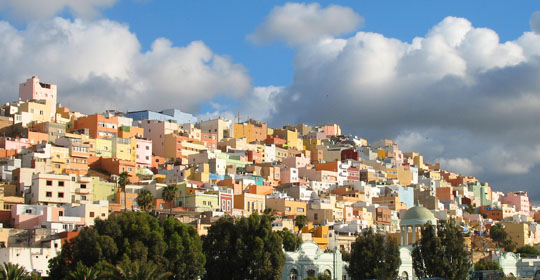
Colourful houses on the hill above the main town of Afortunada. |
| |
 |
| |



toni_m |
|
From: Dr. Antonia Martinez, Universidad Complutense de Madrid, España
To: The Cheshire Cat @ My Favourite Planet

¡Hola Gato!

Here I am finally on the beautiful La Isla Afortunada. It is wonderful... and so far away from it all. And I mean ALL. There is so much to tell you, but you will have to wait a while longer for more news. For such a quiet, sleepy place there is lots going on and my hosts keep me busy all the time showing off their island to me and telling me so many stories. Also, as I suspected, inernet connections are very rare here.

Yesterday was the unveiling of the sculpture of "El Gato de Cheshire" with a big ceremony. There was music, dancing and a real fiesta atmosphere. It seemed that everybody on the island was there, especially the children. Speeches were made in praise of the island, its people, its climate, its mountain, its goats, etc. Poems were recited and songs were sung by young and old in praise of the artists and "El Gato de Cheshire". All composed especially for the occasion. And then, finally... they unveiled your sculpture. What can I say? It looked so fine and brave standing in the middle of the new park... And ...

... Well, I have sent you a few snaps of the sculpture with my comments so that you can judge for yourself.

Adios amigo, Toni

Attachments: Photos of Cheshire Cat sculpture + captions as text file
|
|
| |
| ... First the good news ... |
| |
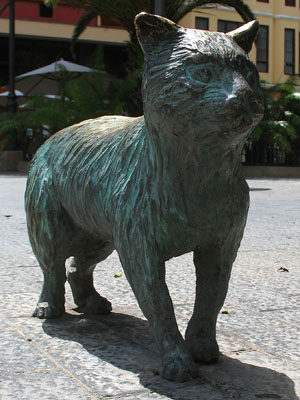
The sculpture of "El Gato de Cheshire"
is very fine and dignified. |
| |
| ... And now the not so good news ... |
| |
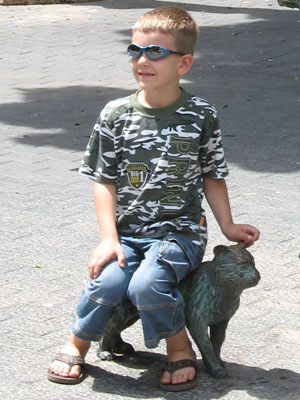
It is not quite as large or grand as one
would have hoped. But he is so cute,
and I am sure it will be dearly loved ;-) |
|
|
Fortunate impressions
 |
| |
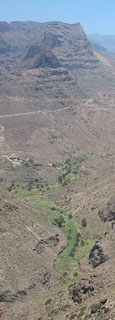 |
| |
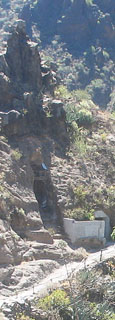 |
| |
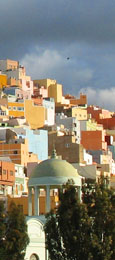 |
| |
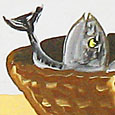 |
| |
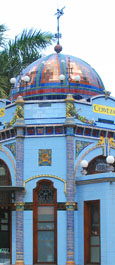 |
| |
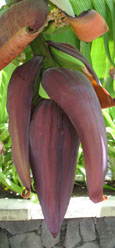 |
| |
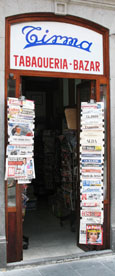 |
| |
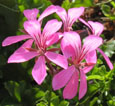 |
| |
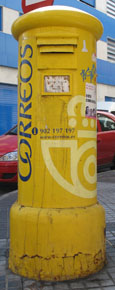 |
| |
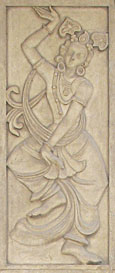 |
| |
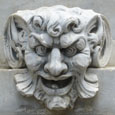 |
| |
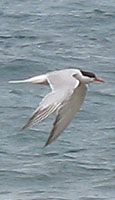 |
| |
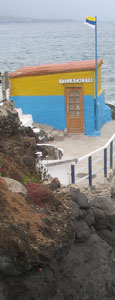 |
| |
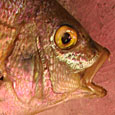 |
| |
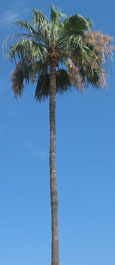 |
| |
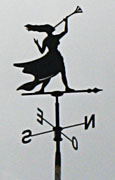 |
| |
 |
| |
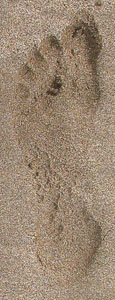 |
| |
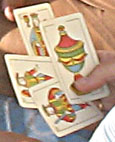 |
| |
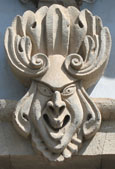 |
| |
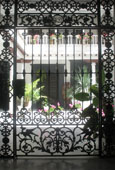 |
| |
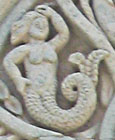 |
| |
 |
| |
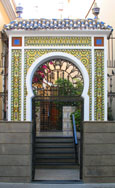 |
| |
 |
| |
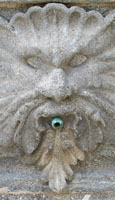 |
| |
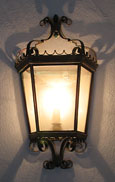 |
| |
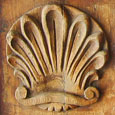 |
| |
All photos
on this page
© My Favourite Planet
If you would like
to use any of the photos for your website, blog or publication, please get in contact.
Higher resolution versions are available on request. |
| |
| |
Que voz vem no som das ondas
Que não é a voz do mar?
E a voz de alguém que nos fala,
Mas que, se escutarmos, cala,
Por ter havido escutar.
E só se, meio dormindo,
Sem saber de ouvir ouvimos
Que ela nos diz a esperança
A que, como uma criança
Dormente, a dormir sorrimos.
São ilhas afortunadas
São terras sem ter lugar,
Onde o Rei mora esperando.
Mas, se vamos despertando
Cala a voz, e há só o mar.
Ilhas Afortunadas
by Fernando Pessoa
(Portuguese poet, 1888-1935) |
"There is a good deal of Spain that has not been
perambulated. I would have you go thither."
Doctor Johnson to Boswell
Traditional Afortunadan sayings
"Ay! que pena, no ser de Afortunada."
"Ah! What a shame, not be from Afortunada."
"Tierra de santos y de cantos."
"Land of saints and boulders."
"El amor es fuego, pero con él no se cuece el puchero."
"Love is a furnace, but it will not cook the stew."
"Hoy casado, manaña cansado."
"Today married, tomorrow tired."
"Los muertos en la huesa, y los vivos a la mesa."
"The dead to their graves, the living to their dinners."
"La mentira y la torta, gorda."
"A cake and a lie, let them be big." |
|
Article and photos copyright © David John 2007-2011
The Cheshire Cat Blog at My Favourite Planet Blogs
Thanks (and apologies) to the people of Gran Canaria, Spain.
Any resemblance to real places, people or cats,
living or otherwise, is completely coincidental.
We welcome comments and feedback on these articles
and all other blogs on My Favourite Planet.
Please get in contact.
The photos on this page are copyright protected.
Please do not use them without permission.
If you wish to use any of the photos for your website,
blog, project or publication, please get in contact.
Higher resolution versions are available on request. |
 |
Visit the My Favourite Planet Group on Facebook.
Join the group, write a message or comment,
post photos and videos, start a discussion... |
|
Views of blog authors do not necessarily reflect those of the publishers
or anyone else at, on or in the vicinity of My Favourite Planet. |
 |
| |
|
|
| |
| |
 |
| |
 |
| |
 |
| |
 |
| |
 |
| |
 |
| |
George Alvanos
rooms
in Kavala's historic Panagia District
Anthemiou 35,
Kavala, Greece
kavalarooms.gr |
| |
| |
Olive Garden Restaurant
Kastellorizo,
Greece +30 22460 49 109
kastellorizo.de |
| |
| |
Papoutsis
Travel Agency
Kastellorizo,
Greece +30 22460 49 286
greeklodgings.gr |
| |
| |
|